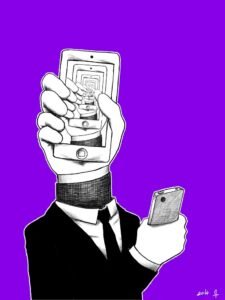My Mum wrote me a long email after our time together over Christmas to express how shocked she was to notice the amount of time I was spending with my head buried in my iPhone. For a lot of folk like myself working in communication, the lines between work and play have become blurred. We are on our screens. All. The. Effing. Time. Devices mean that there is less of a separation between my time at the office and home.
Something isn’t right. And its time I assess whether my addiction to my smartphone has gone a step too far. Do I need to rethink my relationship with technology? I know what do want: a meaningful life, a sense community, and a balanced existence. I think the hypnotic and insidious influence of my iPhone is starting to get in the way of that.
The more I think about it, the more phone ‘business’ seems to be a rubbish strategy for 3 reasons.
- All those things I keep meaning to do – those things that will make a real difference in my life and career – are hard to do. Phone-busy makes matters worse. By getting caught up in repetitive and compulsive phone-checking which adds very little value, the big stuff – my longer-term thinking and the creativity – get brushed under the carpet. How many of these phone-checks are mission critical? It’s the cognitive equivalent of a marathon runner who smokes. Research suggests screen distraction is the mortal enemy of creative flow. Interruptions pull us from it and quicken our brainwaves to beta state making it hard to get back in the zone. A study led by Gloria Mark PhD of the University of California Irvine says it takes an average of 23 minutes and 15 seconds to get back to the task. And as MIT professor Cal Newport puts it, ‘The way a professional athlete takes their diet very seriously, I take sources of distraction very seriously.’
- I figure if I want to achieve a calmer, more effective and happier life, time-managing ‘busyness’ is not the solution. Taking on less in the first place might be a more workable solution.
- I’ve seen a lot of data to suggest people in the West aged 25-34 look at their devices 50 times per day. It’s important to remember, there is a small squirt of a cocaine-like dopamine release each time you look at your email. Device-checks release opiate-like substances. So, I ask myself: Of those 50 times, how many device-checks were productive, essential or genuinely informative?
It’s easier to merely react; to choose to try to do everything. I noticed I had become a bit of a groundhog. Too busy to awaken and do the things I know will make an impact and differentiate myself. So, I’ve narrowed this down to the following 5 steps:
- Download an app called Moment to monitor my weekly screen time (yes, another app – the irony…)
- Aim for states of flow in which activities become ‘autotelic’ meaning it is an end in itself – and enjoyable for its own sake – as opposed to being result-driven.
Will let you know how I get on guys!
